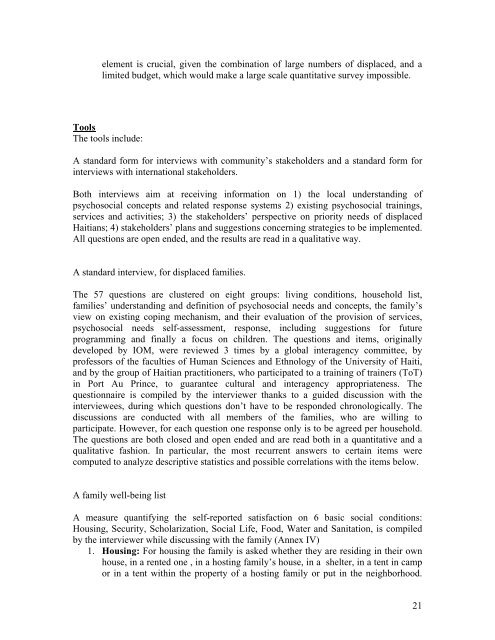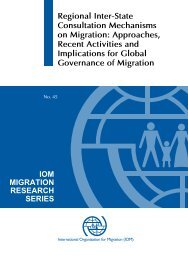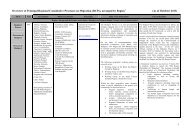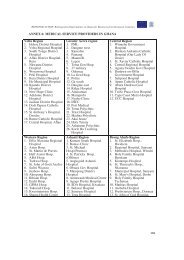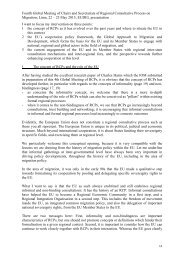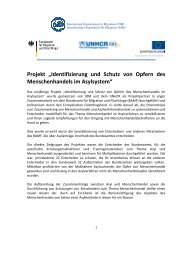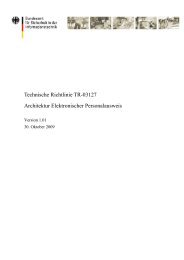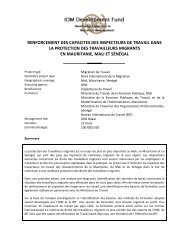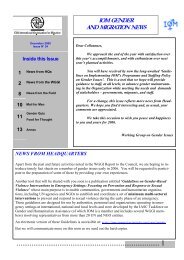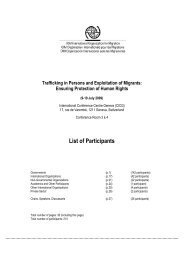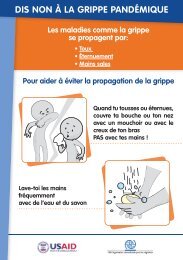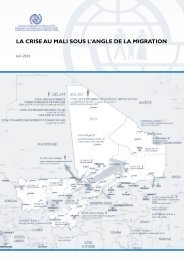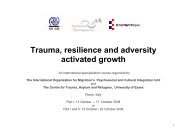IOM - Assessment on the Psychosocial Needs of Haitians Affected ...
IOM - Assessment on the Psychosocial Needs of Haitians Affected ...
IOM - Assessment on the Psychosocial Needs of Haitians Affected ...
You also want an ePaper? Increase the reach of your titles
YUMPU automatically turns print PDFs into web optimized ePapers that Google loves.
element is crucial, given <strong>the</strong> combinati<strong>on</strong> <strong>of</strong> large numbers <strong>of</strong> displaced, and a<br />
limited budget, which would make a large scale quantitative survey impossible.<br />
Tools<br />
The tools include:<br />
A standard form for interviews with community’s stakeholders and a standard form for<br />
interviews with internati<strong>on</strong>al stakeholders.<br />
Both interviews aim at receiving informati<strong>on</strong> <strong>on</strong> 1) <strong>the</strong> local understanding <strong>of</strong><br />
psychosocial c<strong>on</strong>cepts and related resp<strong>on</strong>se systems 2) existing psychosocial trainings,<br />
services and activities; 3) <strong>the</strong> stakeholders’ perspective <strong>on</strong> priority needs <strong>of</strong> displaced<br />
<strong>Haitians</strong>; 4) stakeholders’ plans and suggesti<strong>on</strong>s c<strong>on</strong>cerning strategies to be implemented.<br />
All questi<strong>on</strong>s are open ended, and <strong>the</strong> results are read in a qualitative way.<br />
A standard interview, for displaced families.<br />
The 57 questi<strong>on</strong>s are clustered <strong>on</strong> eight groups: living c<strong>on</strong>diti<strong>on</strong>s, household list,<br />
families’ understanding and definiti<strong>on</strong> <strong>of</strong> psychosocial needs and c<strong>on</strong>cepts, <strong>the</strong> family’s<br />
view <strong>on</strong> existing coping mechanism, and <strong>the</strong>ir evaluati<strong>on</strong> <strong>of</strong> <strong>the</strong> provisi<strong>on</strong> <strong>of</strong> services,<br />
psychosocial needs self-assessment, resp<strong>on</strong>se, including suggesti<strong>on</strong>s for future<br />
programming and finally a focus <strong>on</strong> children. The questi<strong>on</strong>s and items, originally<br />
developed by <str<strong>on</strong>g>IOM</str<strong>on</strong>g>, were reviewed 3 times by a global interagency committee, by<br />
pr<strong>of</strong>essors <strong>of</strong> <strong>the</strong> faculties <strong>of</strong> Human Sciences and Ethnology <strong>of</strong> <strong>the</strong> University <strong>of</strong> Haiti,<br />
and by <strong>the</strong> group <strong>of</strong> Haitian practiti<strong>on</strong>ers, who participated to a training <strong>of</strong> trainers (ToT)<br />
in Port Au Prince, to guarantee cultural and interagency appropriateness. The<br />
questi<strong>on</strong>naire is compiled by <strong>the</strong> interviewer thanks to a guided discussi<strong>on</strong> with <strong>the</strong><br />
interviewees, during which questi<strong>on</strong>s d<strong>on</strong>’t have to be resp<strong>on</strong>ded chr<strong>on</strong>ologically. The<br />
discussi<strong>on</strong>s are c<strong>on</strong>ducted with all members <strong>of</strong> <strong>the</strong> families, who are willing to<br />
participate. However, for each questi<strong>on</strong> <strong>on</strong>e resp<strong>on</strong>se <strong>on</strong>ly is to be agreed per household.<br />
The questi<strong>on</strong>s are both closed and open ended and are read both in a quantitative and a<br />
qualitative fashi<strong>on</strong>. In particular, <strong>the</strong> most recurrent answers to certain items were<br />
computed to analyze descriptive statistics and possible correlati<strong>on</strong>s with <strong>the</strong> items below.<br />
A family well-being list<br />
A measure quantifying <strong>the</strong> self-reported satisfacti<strong>on</strong> <strong>on</strong> 6 basic social c<strong>on</strong>diti<strong>on</strong>s:<br />
Housing, Security, Scholarizati<strong>on</strong>, Social Life, Food, Water and Sanitati<strong>on</strong>, is compiled<br />
by <strong>the</strong> interviewer while discussing with <strong>the</strong> family (Annex IV)<br />
1. Housing: For housing <strong>the</strong> family is asked whe<strong>the</strong>r <strong>the</strong>y are residing in <strong>the</strong>ir own<br />
house, in a rented <strong>on</strong>e , in a hosting family’s house, in a shelter, in a tent in camp<br />
or in a tent within <strong>the</strong> property <strong>of</strong> a hosting family or put in <strong>the</strong> neighborhood.<br />
21


